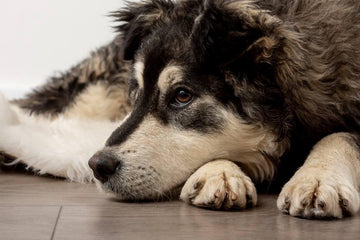
Imagine this: You're lounging on the couch, enjoying a quiet weekend, when your dog settles beside you, contentedly licking paws. It's a familiar scene that some dog owners may find endearing. While occasional paw licking is a regular self-grooming habit, excessive or aggressive paw licking can signal underlying issues that need addressing.
Key Takeaways
- It's natural for dogs to lick their paws as part of their grooming routine. However, if you notice your dog licking excessively or obsessively, it could indicate an underlying issue that requires attention.
- Excessive paw licking in dogs can indicate various problems, such as injuries, allergies, infections, or behavioral issues. Identifying the root cause is crucial to providing the appropriate treatment and ensuring your dog's well-being.
- Using products like Gotta Go Grass® potty pads for dogs can help keep your dog's paws clean and reduce exposure to outdoor allergens and parasites, especially during infestations. These pads offer a simple and effective solution to help manage and prevent issues that lead to excessive paw licking.

5 Possible Reasons Your Dog is Licking Their Paws
Dogs regularly lick their paws as a way to clean them or to relieve some irritation. This behavior is completely normal in moderation. But, if you observe your dog licking their paws constantly or excessively, it could indicate a problem that requires attention, such as injury, irritation, infection, or even a behavioral issue.
Continue reading as we explore the common causes of excessive paw licking and offer practical solutions to manage and resolve the issue. We'll also touch on how simple solutions, like using grass pee pads for dogs, can help keep your dog comfortable and their paws in optimal condition.
1. Pain and Injuries
Dogs tend to lick their paws when experiencing pain or discomfort. This could be due to wounds or foreign objects stuck between their paw pads. Check for any visible injuries or debris if your dog is licking a specific paw or limping. You also want to check for unusual lumps or bumps on your dog's paws. Cysts or growths in the paw area can irritate your dog and lead to excessive paw licking.
Meanwhile, older dogs or those with arthritis may lick their paws due to discomfort from mobility issues. If your dog frequently licks their paws and shows signs of difficulty moving, arthritis might be the cause. A vet can assess and recommend treatments to manage pain and improve mobility.
2. Allergies and Other Skin Conditions
Allergic reactions to environmental factors like chemicals, grass, pollen, and weeds can cause itchy paws, leading dogs to lick their paw pads excessively. Manage this by identifying and reducing exposure to allergens by using pet-friendly products, wiping your dog's paws after walks, and avoiding areas with harmful weeds. Regular baths and hypoallergenic paw balms can also help soothe and protect your dog's paws.
Using grass pads for indoor potty breaks can also avoid exposure to outdoor allergens. If symptoms persist, consult your veterinarian for further evaluation and potential treatments, like allergy testing or antihistamines.
3. Food Allergies
Food-related issues, such as allergies or sensitivities, can often manifest as skin irritations, leading your dog to lick their paws excessively. Common allergens include certain proteins, grains, or additives in dog food. If you observe your dog licking their paws too much, particularly after meals, consider evaluating their diet. Switching to a hypoallergenic diet or a diet free from common allergens can help. Also, consult your vet to identify the cause and ensure a balanced meal plan.
4. Infections
Fleas, ticks, mites, and other parasites can cause intense itching and discomfort, leading your dog to lick their paws frequently. In addition to parasites, bacterial or yeast infections can also develop, especially if their paws are already irritated or damaged. These infections can make your dog’s paw pads even more itchy and uncomfortable, prompting more licking. Regularly check for signs of infections or parasites, such as itching, hair loss, redness, or skin lesions.
Using products like Gotta Go Grass® pads for dogs during infestations can be a helpful preventive measure. These natural grass pads can eliminate the need for outdoor potty breaks, reducing your dog’s exposure to potential parasites in the environment. By keeping your dog’s paws cleaner, the pads also lower the risk of bacterial infections and the chance of bringing parasites into your home.
5. Behavioral Issues
When you or your veterinarian have ruled out all the possible reasons above, you may also want to check for potential behavioral issues. Dogs lick their paws as a coping mechanism for boredom or anxiety. If your dog's excessive paw licking seems linked to behavioral issues, it may be worth considering whether they get enough physical and mental stimulation.
Increasing their playtime, offering interactive toys, and ensuring they get enough exercise can make a significant difference. For anxiety, it's essential to address the root cause. Consulting an animal behaviorist or professional dog trainer can be helpful, as they can provide behavior modification techniques tailored to your dog's specific needs. These may include desensitization, counter-conditioning, and creating a calming environment, all of which can help reduce anxiety-related paw licking.

Final Thoughts
Your dog's paw-licking habit can signal various underlying issues, from injuries and allergies to behavioral problems. Understanding the potential causes and taking appropriate steps to address them can help ensure your dog's comfort and well-being. A proactive approach will contribute to a happier, healthier pet, whether through preventive measures, home remedies, environmental adjustments, or professional consultation.
If you observe any signs of persistent dog paw licking or severe issues, seek veterinary advice to get your dog the help they need.




